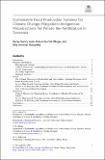| dc.description.abstract | The global rise in human population has led to the intensification of agricultural
activities to meet the ever-rising food demand. The potato (Solanum tuberosum L.)
is a crop with the potential to tackle food security issues in developing countries
due to its short growth cycle and high nutrient value. However, its cultivation is
heavily dependent on artificial fertilizers for yield maximization which culminates in global warming and other environmental problems. There is need,
therefore, for its alternative fertilization technologies to mitigate climate change.
This study evaluated the potential of indigenous rhizobacteria for potato cropping
in Tanzania. Ten potato rhizobacterial isolates belonging to Enterobacter, Klebsiella, Citrobacter, Serratia, and Enterobacter genera were obtained from a
previous collection from different agro-ecological areas in Tanzania. The isolates
were characterized culturally, microscopically, biochemically, and by their carbohydrate utilization patterns. Their in vitro plant growth-promoting (PGP) traits
such as nitrogen fixation, solubilization of phosphates, potassium, and zinc, and
production of siderophores, indole acetic acid, and gibberellic acids were then
evaluated. Lastly, sterilized potato seed tubers were bacterized with the inoculants
and grown in pots of sterile soil in a screen-house using untreated plants as a
control experiment. The potato rhizobacterial isolates had varying characteristics
and showed varying in vitro PGP activities. The screen-house experiment also
showed that the rhizobacterial treatments significantly ( p < 0.05) enhanced
different parameters associated with potato growth by up to 91% and established
the potential of most of the isolates as alternative biofertilizers in potato cropping
systems in Tanzania. | en_US |

